Caregiving can feel like navigating a vast ocean alone, a role filled with deep love but also immense stress and isolation. The relentless demands of caring for a loved one often leave little room for your own needs, making it easy to feel overwhelmed. But what if a lifeline, a community of people who truly understand, was just a click away? That's the power of caregiver support groups online.
This guide is designed to help you find that connection. We've compiled a comprehensive list of the best online communities, from broad forums to specialized groups for conditions like Alzheimer's or cancer. Each entry provides a clear overview of the platform, detailing its key features, membership requirements, and what makes it unique, complete with screenshots and direct links to join. Finding the right community is crucial; for those seeking connections tailored to specific needs, exploring resources like online autism support groups can provide an even more specialized community.
Forget endless searching. This article cuts through the noise to connect you directly with the support systems that can offer validation, practical advice, and a sense of belonging. Let's find the group that fits your journey.
1. ALZConnected (Alzheimer’s Association)
For those caring for a loved one with Alzheimer's or another form of dementia, ALZConnected by the Alzheimer’s Association is one of the most robust and trusted caregiver support groups online. This free community provides a dedicated space where caregivers, family members, and individuals living with the disease can connect, share experiences, and find credible information. It stands out by integrating peer support directly with the extensive resources of a major national health organization.
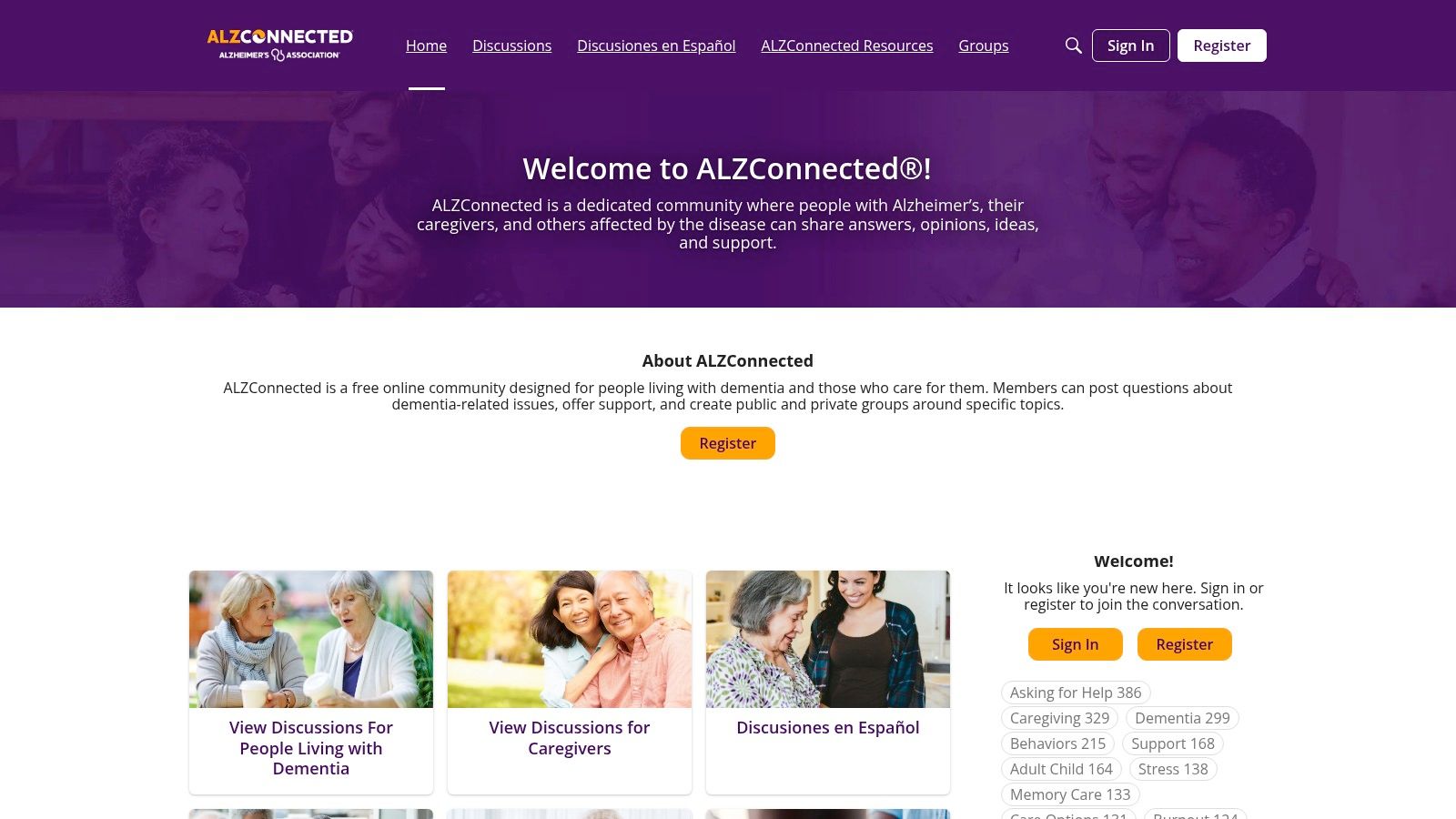
The platform is built around a traditional forum-based structure, allowing for 24/7 asynchronous conversations. This format is ideal for caregivers who need to seek advice or vent during unconventional hours, like late at night or early in the morning, without the pressure of a live meeting. The user experience is straightforward, with clear navigation to different topic-based groups.
Key Features and User Experience
ALZConnected is more than just a forum; it's a multi-faceted support system. Members can join various public and private groups tailored to specific needs and interests.
- Dedicated Discussion Areas: You can find specific forums for "Caregivers," "People with Dementia," and even specialized topics like "Younger-Onset Alzheimer's." This segmentation ensures conversations are relevant and targeted.
- Moderated and Safe Environment: Unlike generic social media groups, ALZConnected is moderated by trained staff and volunteers. This helps maintain a supportive tone and ensures the information shared aligns with the latest research and best practices.
- Bilingual Support: The platform offers dedicated discussion boards in Spanish, making it accessible to a wider community of caregivers.
- Resource Integration: A key benefit is its direct link to the Alzheimer’s Association's 24/7 Helpline, local chapter services, and educational materials. This creates a seamless pathway from peer support to professional assistance. For more in-depth information on managing daily routines, you can learn about building a structured plan for Alzheimer’s care at home.
How to Get Started
Joining is simple and completely free. You create an account with a username and password, which allows you to post and engage with the community. While the forum format may not appeal to those seeking real-time video chats, its depth, active user base, and connection to a leading advocacy organization make it an indispensable resource for dementia caregivers.
Website: ALZConnected.org
2. Family Caregiver Alliance (FCA)
The Family Caregiver Alliance (FCA) is a long-standing national nonprofit that provides a multi-faceted approach to caregiver support. It distinguishes itself by offering a hybrid model that caters to different communication styles and schedules, making it one of the most versatile caregiver support groups online. Whether you prefer the constant connection of an email listserv or the face-to-face interaction of a scheduled video call, the FCA has a resource designed to meet your needs.
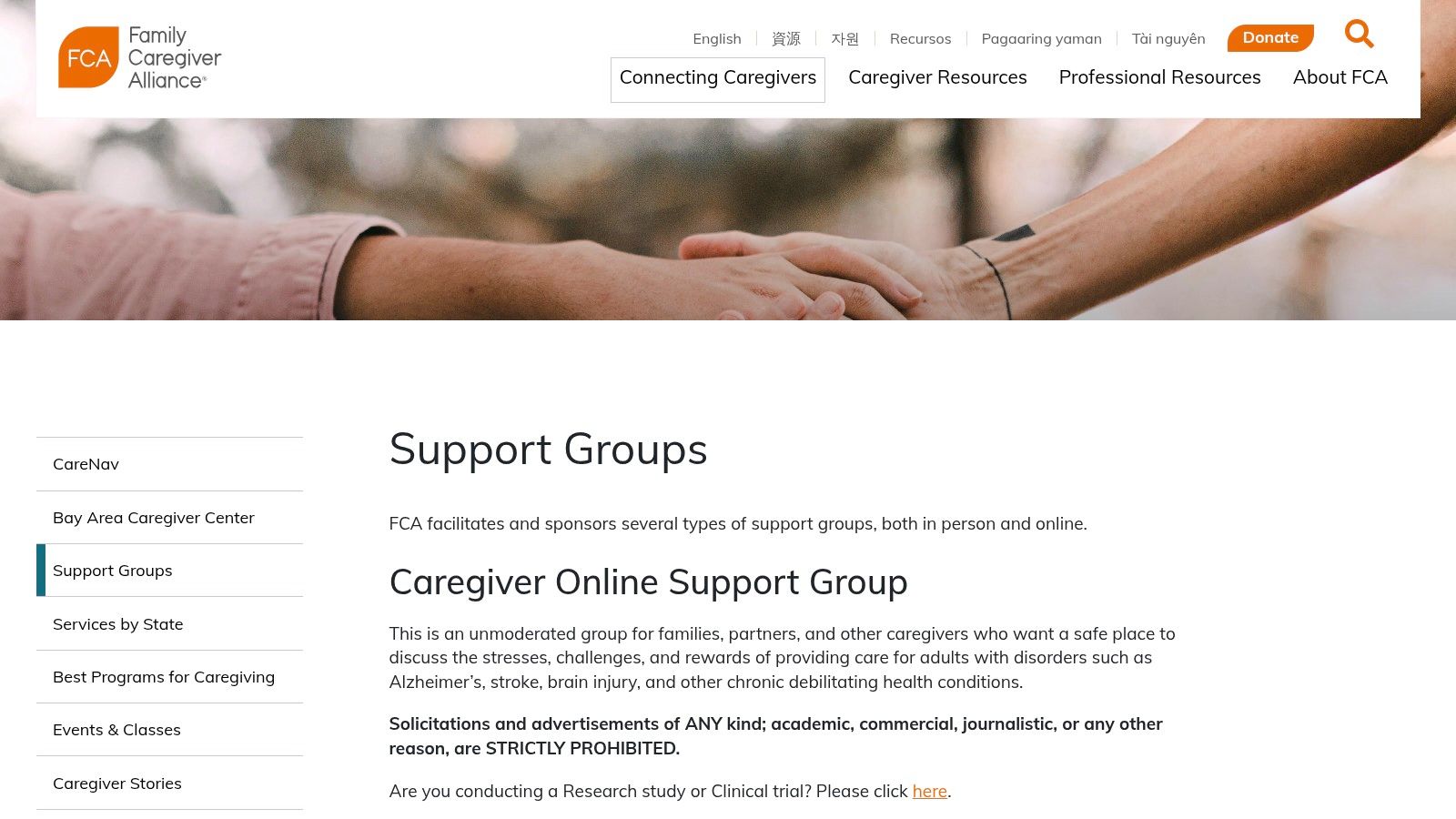
This blend of asynchronous and real-time support, backed by a deep library of educational materials, makes the FCA a comprehensive hub for family caregivers. It acknowledges that a caregiver’s need for connection can arise at any moment, while also recognizing the value of structured, community-specific conversations. The user experience is centered around finding the right format for you.
Key Features and User Experience
The FCA provides several distinct avenues for connection and information, allowing caregivers to choose what works best for them. All support groups are free to join.
- Diverse Support Formats: The FCA offers both an always-on, unmoderated email listserv (Caregiver Online Support Group) for 24/7 peer discussion and scheduled, professionally facilitated Zoom groups for live interaction.
- Thematic and Affinity Groups: It hosts specialized groups for specific communities, such as LGBTQ+ caregivers, young adult caregivers, and those caring for someone with a particular condition. This ensures members can connect with others who share their unique experiences.
- Integrated Educational Resources: Beyond peer groups, the FCA provides CareNav, a personalized dashboard with resources tailored to your specific caregiving situation, and an extensive online library of articles, webinars, and fact sheets.
- Professional Facilitation: Many of the live support groups are led by trained professionals, which helps guide conversations, maintain a supportive environment, and provide expert insight when needed.
How to Get Started
Accessing the FCA’s support groups is straightforward. You can browse the available groups on their website and sign up for the email listserv directly or register for a scheduled Zoom meeting. While some live groups may have geographic or capacity limits, the email group is open to all. This flexibility, combined with its strong reputation and targeted support options, makes the FCA an invaluable resource for any caregiver seeking community.
Website: www.caregiver.org/connecting-caregivers/support-groups/
3. NAMI Family Support Groups
For family members and caregivers of individuals living with mental health conditions, the National Alliance on Mental Illness (NAMI) offers one of the most structured and accessible caregiver support groups online. These free, peer-led groups provide a confidential space to gain insight from the shared experiences of others in similar situations. NAMI's strength lies in its standardized, evidence-informed model, which is implemented by local affiliates nationwide, creating a consistent and reliable support system.
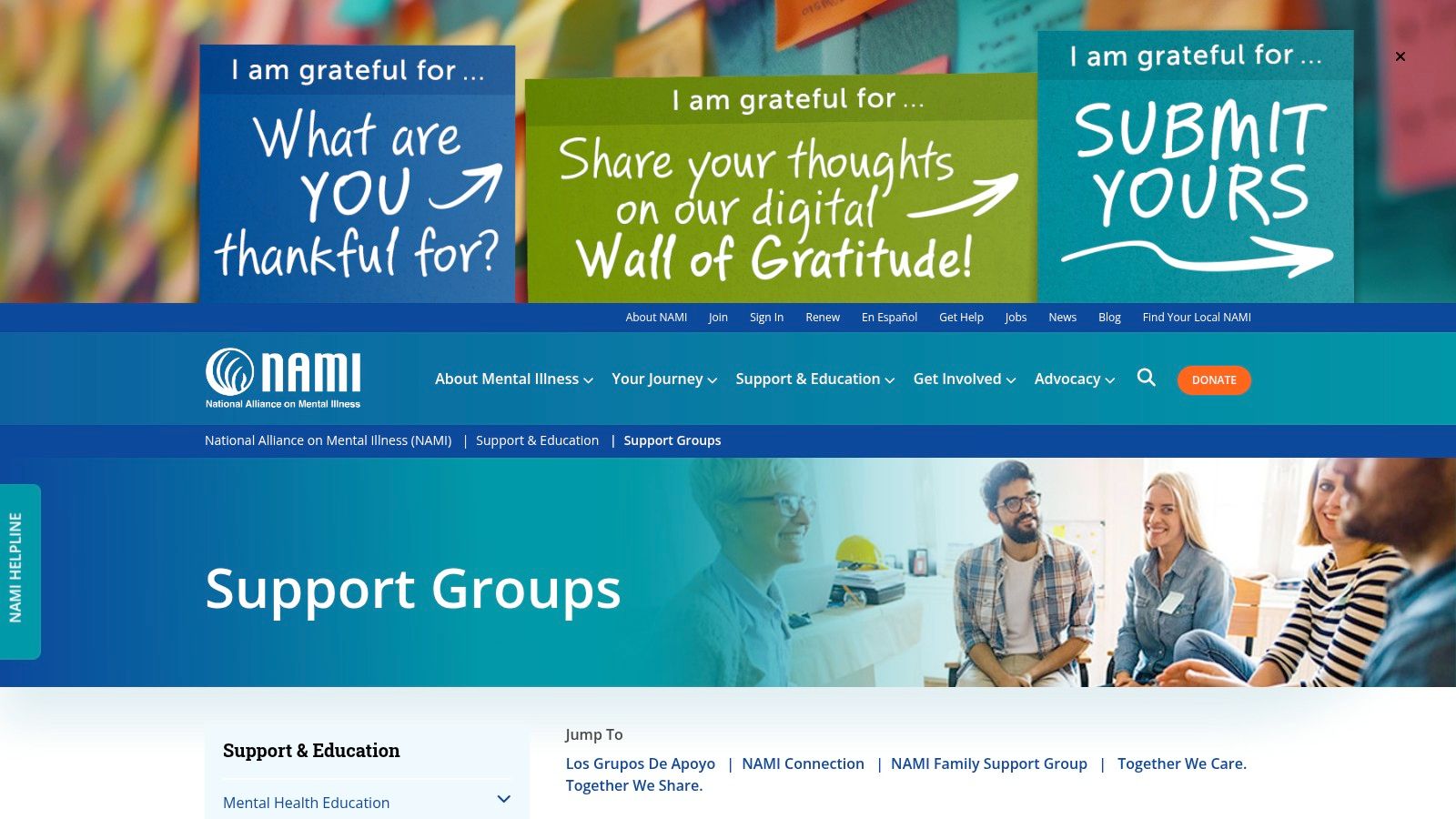
Unlike open-ended forums, NAMI groups are typically structured as live virtual meetings, often held via Zoom. This format facilitates real-time connection and conversation, allowing participants to build community and share coping strategies face-to-face. While focused specifically on mental health, the widespread availability of virtual sessions means caregivers can often find a group that fits their schedule, regardless of their location.
Key Features and User Experience
NAMI Family Support Groups are designed around a peer-facilitated model that ensures a welcoming and productive environment for all attendees. The experience is guided by trained facilitators who also have lived experience as family caregivers.
- Peer-Led, Structured Model: Each meeting follows a consistent structure, ensuring that everyone has an opportunity to share and get support. This prevents conversations from being dominated by a few voices and maintains a focus on constructive problem-solving.
- Virtual and Local Access: The national NAMI website provides a hub to find local affiliates, many of which now offer virtual support groups. This hybrid approach allows caregivers to find groups that are open across state lines, offering immense flexibility.
- Confidential and Safe Space: All groups are confidential, providing a secure setting to discuss sensitive topics without fear of judgment. Facilitators ensure the space remains respectful and supportive.
- Bilingual and Crisis Resources: NAMI offers resources and some support groups in Spanish, alongside a national HelpLine for immediate information and support. The focus on mental wellness is a critical aspect, and you can learn more about protecting caregiver mental health.
How to Get Started
Joining a NAMI Family Support Group is free, but the process can vary. You’ll need to visit the NAMI website and use their search tool to find your local affiliate. From there, you can view their calendar of events and register for a virtual or in-person group. Because scheduling and sign-up are managed by individual affiliates, some may have waitlists, while others allow drop-in attendance. This localized approach makes it a powerful grassroots resource for mental health caregivers.
Website: nami.org/Support-Education/Support-Groups/
4. CancerCare Online Support Groups
For individuals caring for a loved one with cancer, CancerCare offers professionally moderated, password-protected caregiver support groups online that provide a structured and confidential healing environment. This non-profit organization stands out by leading its groups with licensed oncology social workers, ensuring that discussions are guided by trained professionals who understand the complexities of a cancer diagnosis. These groups offer a safe harbor for caregivers to share their fears, frustrations, and hopes with others who truly understand their journey.
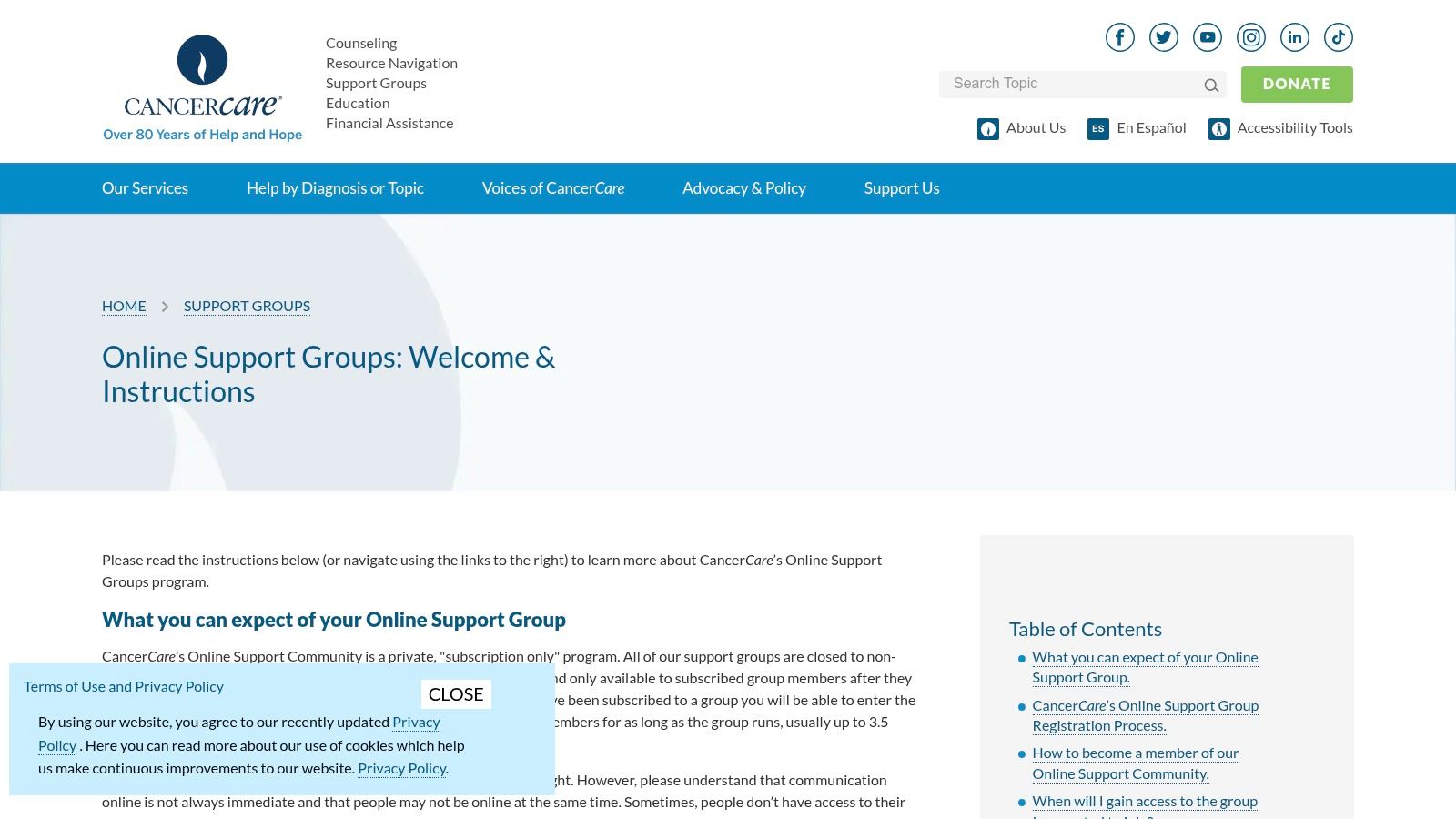
The platform uses a message-board style forum that allows for 24/7 asynchronous access. This model is highly beneficial for caregivers juggling unpredictable schedules, as they can post and respond at any time of day or night. The groups are not open forums; instead, they operate in structured, 15-week cycles with a pre-registration process, creating a consistent and tight-knit cohort of members for each session.
Key Features and User Experience
CancerCare’s model prioritizes safety, professional guidance, and deep peer connection within a secure, private setting. This clinical approach makes it a uniquely reliable resource.
- Led by Oncology Social Workers: Every group is facilitated by a licensed oncology social worker. This professional moderation ensures a safe, supportive, and constructive environment, which is a significant advantage over peer-led social media groups.
- Structured 15-Week Cycles: Members join a specific group for a fixed 15-week period. This cohort model helps build trust and strong bonds among participants as they progress through their caregiving experiences together.
- Confidential and Password-Protected: Unlike public forums, these groups are private and require a screening and registration process. This confidentiality allows caregivers to share openly and honestly without fear of their personal stories being publicly visible.
- Variety of Specific Groups: CancerCare often provides multiple groups tailored to different needs, including those for caregivers of people with specific cancer types or at different stages. For those specifically caring for individuals with advanced cancer, consider additional resources for supporting stage 4 cancer patient families and caregivers.
How to Get Started
Access to these free groups requires a screening and registration process to ensure all members are a good fit for the cohort. You can view upcoming caregiver groups on their website and submit an application. Because groups run in cycles, you may need to wait for the next session to begin. While this structured model means support isn't always available on-demand, the high-quality, professionally-led guidance it provides is invaluable.
Website: CancerCare.org Online Support Groups
5. AARP Family Caregivers Discussion Group (Facebook)
For caregivers who are already active on social media, the AARP Family Caregivers Discussion Group on Facebook offers a convenient and accessible platform. As a private group backed by one of the nation's leading non-profits for older adults, it provides a massive, built-in community where tens of thousands of members can share advice, ask for help, and find emotional solidarity. Its primary advantage is integrating support directly into a familiar daily routine for millions of users.
The group operates within the standard Facebook interface, making it incredibly easy to join and participate without learning a new platform. This format encourages frequent, real-time interaction, with members posting questions and receiving responses from peers around the clock. The community is large and diverse, covering a wide spectrum of caregiving situations rather than focusing on a single disease.
Key Features and User Experience
AARP's group blends peer-to-peer connection with professionally curated content, offering a unique hybrid support model among online caregiver support groups. This ensures that conversations are not only supportive but also informed.
- Private and Secure Conversations: As a private group, all posts and comments are only visible to members, creating a more confidential space to share personal stories and challenges.
- Expert-Led Live Sessions: AARP frequently hosts Facebook Live events with caregiving experts, covering topics from financial planning to managing caregiver stress. These sessions are archived, allowing members to watch them on demand.
- Resource Integration: The group is a direct gateway to AARP's extensive library of caregiver guides, articles, webinars, and local resources, providing credible information to supplement peer advice.
- Active Moderation: AARP staff and moderators ensure the community remains a supportive and respectful environment, removing spam and guiding conversations toward productive outcomes.
How to Get Started
Joining requires a personal Facebook account. You simply search for the "AARP Family Caregivers Discussion Group," click "Join Group," and answer a few simple membership questions. Once approved, you can immediately start posting and interacting. While its reliance on Facebook’s algorithms can affect post visibility and the advice is crowdsourced, the sheer size of the community and the direct involvement from AARP make it an invaluable and convenient hub for family caregivers. By joining, you get practical tips and emotional support from one of the most active caregiver support groups online.
Website: AARP Family Caregivers Discussion Group
6. AgingCare Caregiver Forum
For caregivers navigating the complexities of eldercare, the AgingCare Caregiver Forum is a long-standing and highly active hub for peer support. This free platform operates as one of the most comprehensive caregiver support groups online specifically tailored to the challenges of caring for aging parents and relatives. It excels by combining a bustling question-and-answer forum with a deep library of expert articles, local provider directories, and practical guides, creating a one-stop resource for eldercare needs.
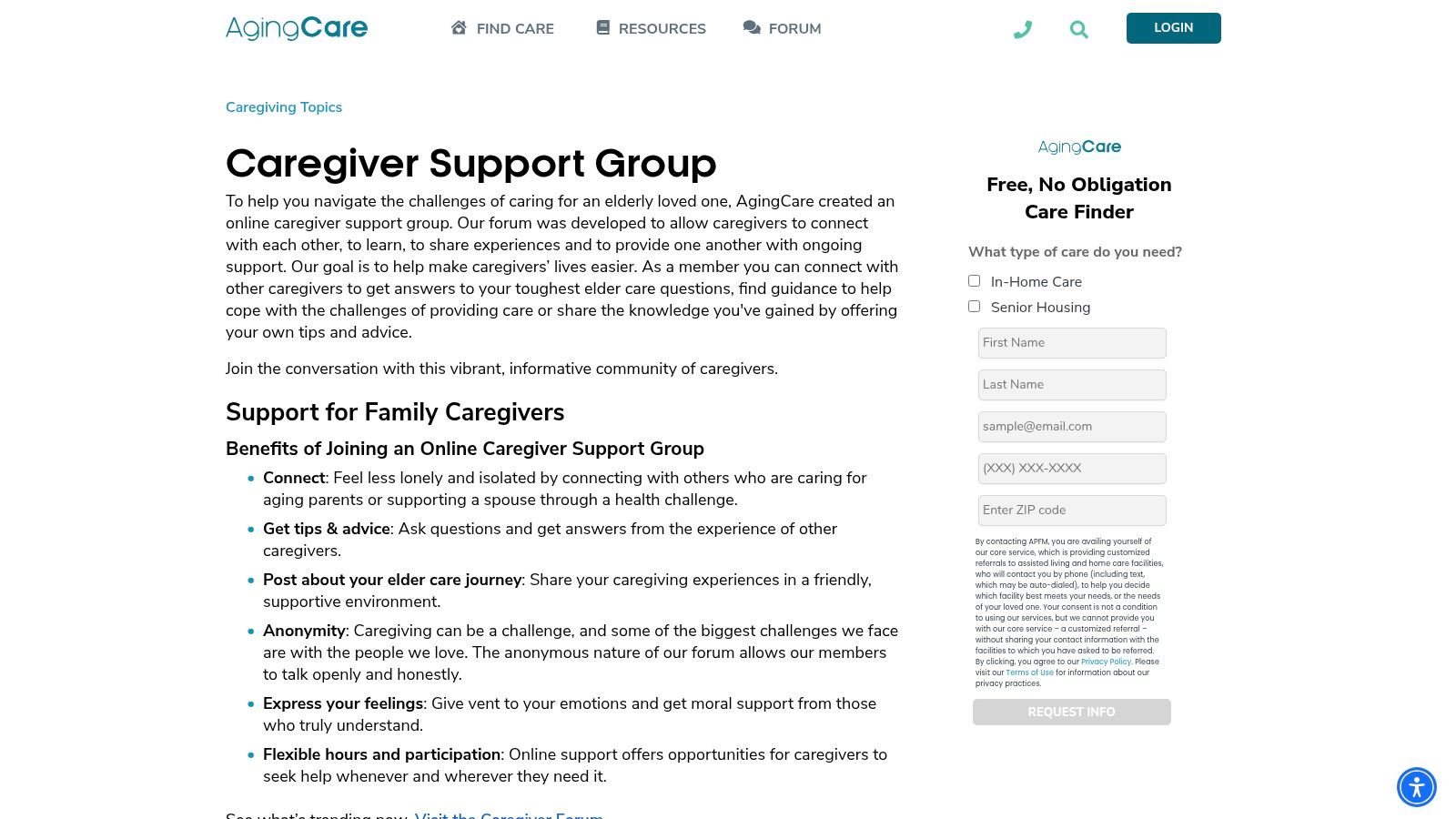
The forum is designed for asynchronous communication, which is perfect for caregivers who need to find answers or share their frustrations at any time, day or night. Its structure is based on user-generated questions and threads, allowing for a constant flow of fresh conversations on a huge variety of topics. The user interface is straightforward, making it easy to search for past discussions or post a new question to the community.
Key Features and User Experience
AgingCare offers a robust platform that goes beyond simple discussion, providing practical tools and a wealth of information. The community is known for its quick, empathetic, and experienced-based responses.
- Diverse Topic Coverage: The forum covers a wide range of eldercare issues, including dedicated sections for dementia, financial and legal matters, in-home care, and managing family relationships. This ensures users can find targeted advice for their specific situation.
- Searchable Knowledge Base: One of its strongest assets is the massive archive of past conversations. Caregivers can search for almost any eldercare-related problem and find years' worth of real-world experiences and solutions from their peers.
- Resource and Directory Integration: Unlike standalone forums, AgingCare seamlessly links forum discussions to its extensive library of articles and a directory of local senior care providers. This helps caregivers move from seeking advice to taking concrete action.
- Active Moderation: The forum is actively moderated to maintain a supportive and safe environment, with clear reporting tools available to manage any inappropriate content.
How to Get Started
Joining the AgingCare community is free and simple. While anyone can browse the forums and read existing conversations, you must register for an account to post questions or reply to others. The traditional forum format may not be ideal for those seeking live video interaction, but its large, active user base and immense library of archived knowledge make it an invaluable resource for anyone facing the practical realities of caring for an aging loved one.
Website: agingcare.com/topics/126/support-group
7. Well Spouse Association
Caring for a spouse or partner with a chronic illness or disability presents a unique set of emotional, financial, and logistical challenges. The Well Spouse Association (WSA) is a national nonprofit organization dedicated exclusively to supporting these spousal caregivers, making it one of the most specialized caregiver support groups online. It offers a safe harbor where partners can connect with others who truly understand the profound impact this role has on a marriage and personal identity.
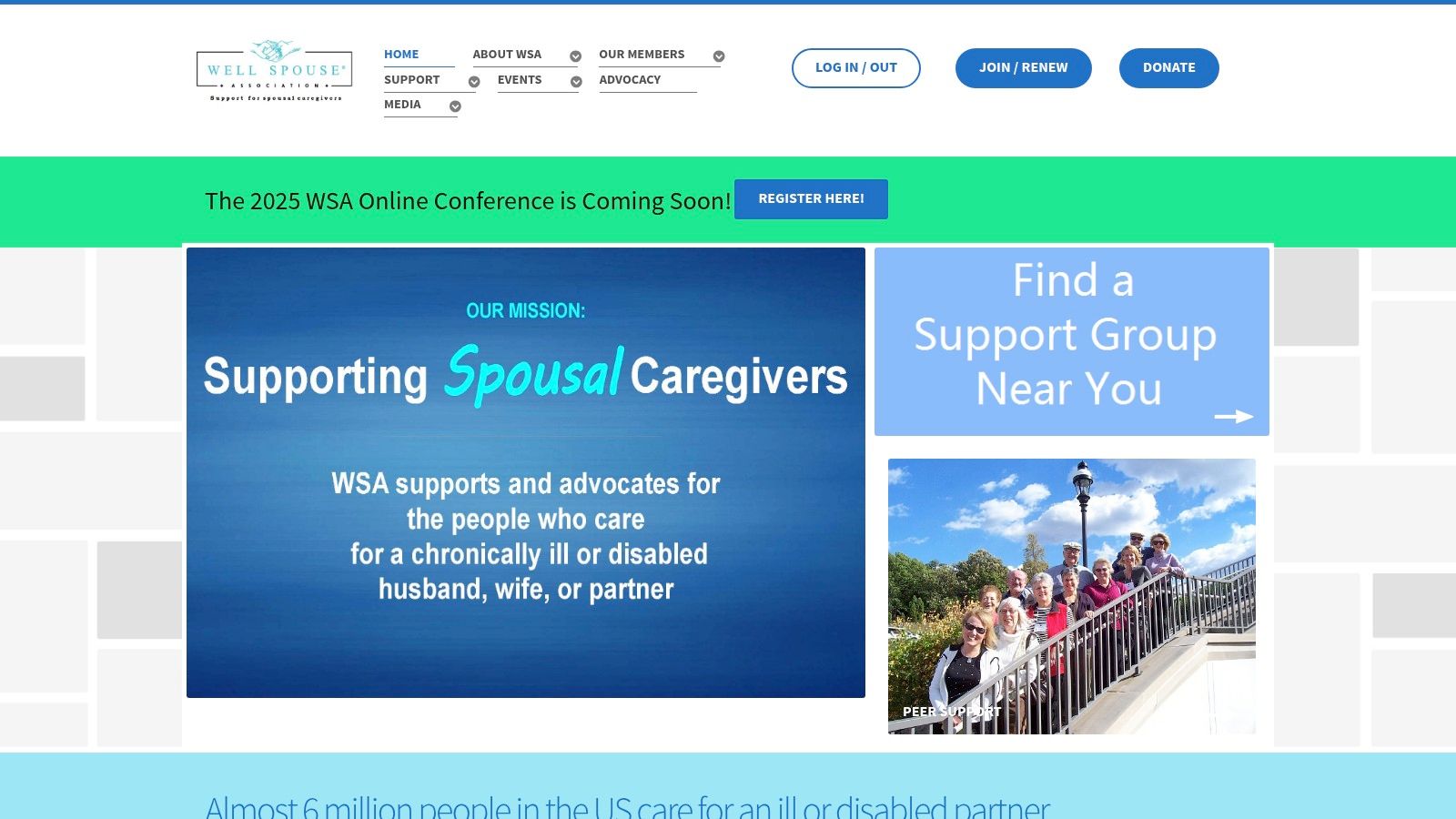
The platform’s strength lies in its highly focused peer-matching and multi-format support system. It combines live, interactive meetings via phone and Zoom with an asynchronous, members-only online forum. This hybrid approach ensures that spousal caregivers can find support that fits their schedule and comfort level, whether they need immediate interaction or a place to reflect and write.
Key Features and User Experience
WSA provides a comprehensive ecosystem of support that goes beyond a simple discussion board. Membership is required for full access, which ensures a committed and secure community environment.
- Diverse Peer Support Groups: The association facilitates over 25 monthly peer groups nationwide, many of which are virtual and accessible from anywhere. It also offers specialty groups tailored to specific demographics, such as younger spouses or former spousal caregivers.
- Live and Asynchronous Options: Members can participate in scheduled phone or Zoom support groups for real-time connection or use the members-only online forum to post questions and share experiences 24/7.
- Mentoring and Events: WSA offers a one-on-one mentoring program, connecting new members with experienced spousal caregivers. The organization also hosts national conferences, webinars, and respite events to provide education and a much-needed break.
- Financial Assistance: Recognizing the financial strain of caregiving, WSA offers scholarships and hardship accommodations for its membership fees, ensuring support is accessible to those in need.
How to Get Started
Joining the Well Spouse Association requires a paid membership, which grants access to its full suite of resources, including the online forum and support groups. While the paid model and niche focus may not suit every caregiver, it creates a deeply empathetic and highly relevant community for those navigating the unique journey of spousal caregiving.
Website: wellspouse.org
Comparison of 7 Online Caregiver Support Groups
| Service | Format & Complexity 🔄 | Resource Requirements ⚡ | Expected Outcomes ⭐ / Impact 📊 | Ideal Use Cases 💡 | Key Advantages ⭐ |
|---|---|---|---|---|---|
| ALZConnected (Alzheimer’s Association) | Asynchronous forums & topic groups; moderated; easy registration | Free; internet access; low time commitment; Spanish available | High disease-specific peer support and reliable info. ⭐⭐⭐⭐ | Caregivers of people with Alzheimer’s/dementia seeking moderated, disease-specific community | Active, moderated community with Association tie-ins and helpline |
| Family Caregiver Alliance (FCA) | Email listserv + scheduled Zoom groups; mixed moderation; moderate setup | Free; email/Zoom accounts; variable time per group | Broad education + peer support; quality varies by channel. ⭐⭐⭐ | Caregivers wanting both asynchronous (email) and live thematic groups | Mix of always-on email support, themed Zooms, and CareNav personalization |
| NAMI Family Support Groups | Peer-led virtual/in-person groups via affiliates; standardized model; moderate | Free; Zoom/local attendance; bilingual options; time for scheduled meetings | Consistent, evidence-informed peer support across affiliates. ⭐⭐⭐⭐ | Family/caregivers of people with mental health conditions seeking structured peer groups | Standardized peer model, wide U.S. footprint, demographic-specific options |
| CancerCare Online Support Groups | Password-protected message boards in 15-week cohorts; screening required; higher complexity | Free; enrollment/screening; asynchronous access during cohort; commitment to cycle | High-quality clinically facilitated support and cohort bonding. ⭐⭐⭐⭐ | Patients and caregivers affected by cancer who want professionally led, confidential cohorts | Licensed oncology social workers as facilitators; confidential, structured cohorts |
| AARP Family Caregivers Discussion Group (Facebook) | Private Facebook group with Live sessions; low technical complexity if on Facebook | Free; Facebook account required; app or web access; frequent engagement | Large, timely peer exchanges and expert sessions; variable quality. ⭐⭐⭐ | Caregivers wanting a large, easy-access community and AARP expert events | Very active membership and regular expert-led Live chats |
| AgingCare Caregiver Forum | Open 24/7 forum and searchable archive; low complexity to browse/post | Free; internet access; time to search/post; registration to post | Quick peer responses and extensive practical archives. ⭐⭐⭐ | Eldercare caregivers seeking practical, real-world advice and provider info | Rich archived content, active community, integrated guides/directories |
| Well Spouse Association | Members-only forum + phone/Zoom peer groups, mentoring and events; moderate complexity | Membership required for most resources (scholarships available); time for groups/events | Highly focused spousal peer matching and specialty support. ⭐⭐⭐⭐ | Spouses/partners providing long-term care who want matched peers and mentoring | Targeted peer matching, mix of live/asynchronous options, conferences/webinars |
Your Next Step: From Virtual Connection to Real-World Support
The journey of caregiving, while deeply rewarding, is often marked by moments of isolation, stress, and uncertainty. As we've explored, finding the right caregiver support groups online transforms this solitary path into a shared experience. From the specialized, condition-specific communities like ALZConnected and CancerCare to broad-based forums like the Family Caregiver Alliance and AgingCare, a digital lifeline is always within reach. These platforms offer more than just advice; they provide a crucial sense of belonging and validation from peers who truly understand the daily realities you face.
The key takeaway is that you are not alone, and the right community is waiting for you. Your next step isn't just to pick one group, but to strategically choose the one that aligns with your unique circumstances. This deliberate selection process is vital for finding a space where you feel truly seen and heard.
Choosing Your Community: A Practical Guide
To move from reading this article to actively participating in a supportive network, consider these actionable steps:
- Assess Your Primary Need: Are you looking for emotional validation, practical tips for a specific condition like dementia, or a place to vent after a tough day?
- For Condition-Specific Advice: Turn to ALZConnected, NAMI, or CancerCare.
- For General Peer Support: AARP's Facebook group or the AgingCare forum are excellent starting points.
- For Spousal Caregivers: The Well Spouse Association offers a uniquely tailored and understanding environment.
- Evaluate the Platform Style: Do you prefer the structured, moderated environment of a formal organization or the free-flowing, immediate conversation of a social media group? Consider the level of privacy and anonymity that makes you most comfortable.
- Test the Waters: You don't have to commit to just one group. Join two or three that seem promising. Spend a week observing the tone of the conversations, the responsiveness of the members, and the quality of the information shared. This trial period will help you find the community where you feel the most at home.
Remember, the goal of these caregiver support groups online is to build resilience, not add another task to your plate. If a group feels draining or unhelpful, it's okay to step away and try another. Your well-being is the priority.
Integrating Online Support with In-Person Care
While these virtual communities provide indispensable emotional and informational support, they are one pillar of a comprehensive care strategy. Digital connection offers a powerful way to recharge and strategize, but it cannot replace the necessity of hands-on assistance. True, sustainable caregiving involves building a robust support system that blends peer connection with practical, professional help.
This integrated approach allows you to step back when needed, preventing burnout and ensuring your loved one receives continuous, high-quality care. By leveraging both virtual communities and in-home services, you create a resilient support network that nurtures both you and the person you care for. This balance is not a luxury; it is the cornerstone of a healthy and manageable caregiving journey.
When your support network needs to extend beyond the screen, NJ Caregiving is here to provide the professional, compassionate in-home assistance you need. We specialize in creating customized care plans in Mercer County, including Princeton and Hamilton, that give you the respite and peace of mind you deserve. Visit NJ Caregiving to learn how we can complement your caregiving journey with reliable, hands-on support.


